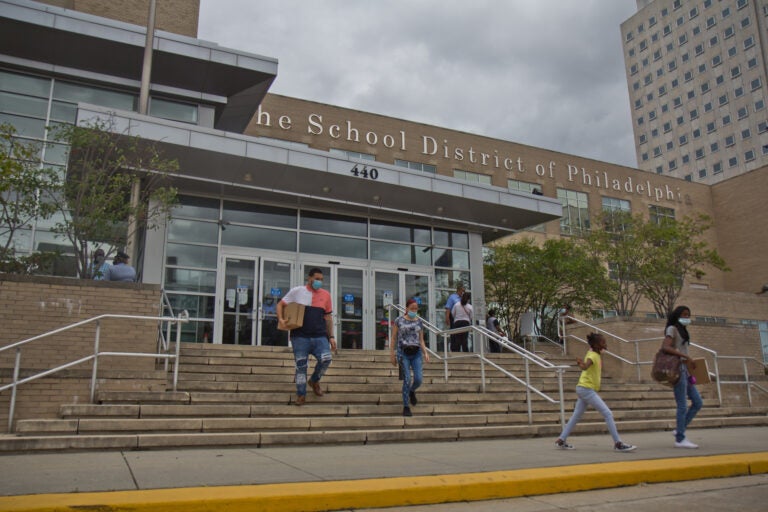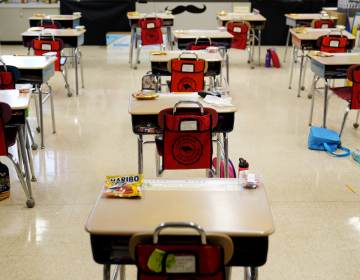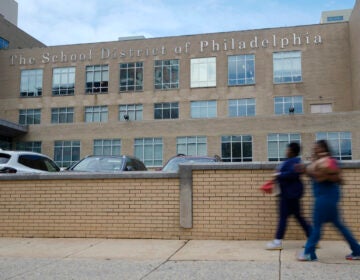Philly schools finalize new bell schedule running counter to doctors; principals feel blindsided
Most high schools will start at 7:30 a.m., and middle schools and elementary schools will start at either 8:15 a.m. or 9 a.m — the opposite of what’s recommended.

Families stand in line at Philadelphia School District headquarters to pick up Chromebooks ahead of the start of the school year in September 2020. (Kimberly Paynter/WHYY)
The School District of Philadelphia just announced a new bell schedule for schools across the city that’s leaving parents, teachers, and principals feeling blindsided and upset because it shifts many high schools to starting earlier and elementary schools to starting later — running counter to advice from pediatricians.
The district is phasing in what it is calling a “standardized approach to school start and end times.” According to the district, beginning in September, bus schedules will align with one of three uniform bell times: 7:30 a.m., 8:15 a.m., or 9 a.m.
On Friday afternoon, the district emailed parents and guardians a note explaining the change, linking to a list that appears incomplete, ending with schools that start with “SH.”
The list shows that most high schools will start at 7:30 a.m., and that middle schools and elementary schools will start at either 8:15 a.m. or 9 a.m. But some lie outside those three times, starting at 7:45 a.m., 8:30 a.m., or 8:45 a.m, with no explanation given for the inconsistency.
The announcement comes a month after the district proposed a similar framework of changes. After backlash from teachers, parents, and school community members, Superintendent William Hite said that the district’s approach would “evolve” with feedback, but that changes were necessary because of a shortage of school bus drivers.
But many high schools are still being moved to those earlier times, despite the ongoing criticism. The American Academy of Pediatrics and the Centers for Disease Control and Prevention have said that middle and high schools should start no earlier than 8:30 a.m. to give students more time to sleep.
Many parents of elementary-age children are also upset that the new schedule makes it harder to coordinate school drop-offs with their own work schedules.
Though the district said it would respond to community feedback in May, Robin Cooper, president of the Commonwealth Association of School Administrators (CASA), said her principals’ union was left out of the conversation.
In the confusion following the district’s initial announcement, school leaders and central office administrators haggled over the draft plan. Wanting to finalize a schedule before summer break, Cooper said most principals had already communicated start times to their school communities, even though things weren’t firmed up with the district.
Now, Cooper said, principals feel blindsided, only hearing about the finalized version after receiving calls of complaints from parents and staff.
“The district is unilaterally making this decision and principals are expected to carry it out, and it creates an atmosphere of distrust between communities and those school leaders,” said Cooper, whose union circulated a petition of “no confidence” in Hite last year.
Asked about CASA’s criticism, school district spokesperson Monica Lewis offered this reply:
“We value the tremendous work our school leaders do, especially all that they’ve done over the course of the last 16 months,” she wrote in an email. “We have and will continue to work with schools and school leaders on this complex and important issue.”
In May, the school district said the schedule proposal was meant to minimize the amount of time students spend on a school bus, streamline routes, help maintain bus cleaning protocols, and counteract transportation staffing shortages that cropped up during the pandemic.
But CASA isn’t behind the district on its reasoning.
“What we said in May still stands true today,” said Cooper. “Transportation shouldn’t dictate educational decisions. Educational decisions should dictate transportation.”
Philadelphia Federation of Teachers president Jerry Jordan said the district’s new “district-wide approach” is unusual and causes “much confusion” compared to how it usually leaves individual schools to decide schedules.
Jordan said the PFT had a “short time to turn information around to building representatives,” adding, “We are still working to address concerns that are arising with individual schools.”
Teresa Kelley, a fourth grade teacher at Lewis Elkin Elementary School, was part of the initial pushback with her building after the district proposed to change its start time from 8:30 a.m. to 9 a.m.
After their response, said Kelley, a union rep, district leaders agreed to keep the start time at 8:30 a.m. But as of Friday, the schedule had changed to 8:15. Kelley seemed unsure what was to happen next, as most of her colleagues are on break.
On top of it all, families still need to be informed of the new schedule. Kelley is concerned about how it will affect the way families are able to drop off their children.
Often, she said, high school students drop off their younger siblings, but with earlier start times for high schoolers, they won’t be able to do that.
“I feel like a change like that should involve surveying families,” said Kelley. “It’s a change that’s affecting every family, they should have some input in it, and none of that has happened.”
The district plans three community forums on Wednesday, July 14, to share with families its reasons for the bell schedule changes.

Get daily updates from WHYY News!
WHYY is your source for fact-based, in-depth journalism and information. As a nonprofit organization, we rely on financial support from readers like you. Please give today.









